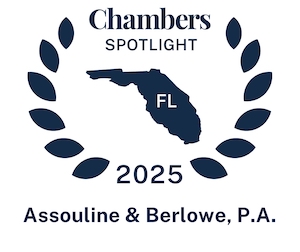International Judicial Assistance
Assouline and Berlowe has handled numeorus international discovery proceedings using Section 1782 of Title 28 of the United States Code.
The United States have adopted a unique mechanism for purposes of assisting judicial proceedings or investigations taking place outside the United States. This procedure is established in Section 1782 of Title 28 of the United States Code, which states:
(a) The district court of the district in which a person resides or is found may order him to give his testimony or statement or to produce a document or other thing for use in a proceeding in a foreign or international tribunal, including criminal investigations conducted before formal accusation. The order may be made pursuant to a letter rogatory issued, or request made, by a foreign or international tribunal or upon the application of any interested person and may direct that the testimony or statement be given, or the document or other thing be produced, before a person appointed by the court. By virtue of his appointment, the person appointed has power to administer any necessary oath and take the testimony or statement. The order may prescribe the practice and procedure, which may be in whole or part the practice and procedure of the foreign country or the international tribunal, for taking the testimony or statement or producing the document or other thing. To the extent that the order does not prescribe otherwise, the testimony or statement shall be taken, and the document or other thing produced, in accordance with the Federal Rules of Civil Procedure.
A person may not be compelled to give his testimony or statement or to produce a document or other thing in violation of any legally applicable privilege.
(b) This chapter does not preclude a person within the United States from voluntarily giving his testimony or statement, or producing a document or other thing, for use in a proceeding in a foreign or international tribunal before any person and in any manner acceptable to him.
Section 1782 thus allows an interested party (such with a procedural o juridical interest) involved in a foreign legal proceeding (including civil, commercial, administrative and even arbitration proceedings), to file a petition before a federal court of the United States requesting evidence and information located within that court’s territorial jurisdiction.
The innovation of Section 1782 is that obviates the traditional system of the international letter rogatory, which implies the involvement of diplomatic authorities of the country requesting the information and the country where the information is located. The letter rogatory mechanism requires a long time to process, involves politics, and transfers control over the gathering of evidence to foreign authorities with no real interest in the foreign litigation. Section 1782 allows the interested party to obtain information directly, through private attorneys located in the United States.
Section 1782 has been used to obtain evidence and information in the United States in all types of foreign proceedings. Some examples are:
- Competitor obtained evidence in possession of microchip company for its use in investigation by the competition agency of the European Union.
- Canadian government secured oral declarations from several individuals domiciled in USA with respect to criminal investigation in Canada.
- Minority shareholder of French company obtained oral declaration of individual located in USA to be used in securities fraud action in France.
- Trustee of Brazil bankruptcy proceeding secured evidence from several USA companies and assets located in the United States linked to bankrupt corporation.
- Spanish company obtained contracts in possession of USA bank for use in civil proceeding in Spain.
- Panamanian company obtained information regarding judgment debtor’s worldwide assets to enforce judgment issued in Panama.
- Saudi Arabian company secured bank records for use in Cayman Island proceeding.
- Chilean government obtained information from several banks located in the United States regarding secret bank accounts connected to Augusto Pinochet.
For purposes of initiating a judicial assistance proceeding, the interested party must file a petition in that regard. The receiving court normally approves the petition in a short period of time. The interested party must then notify the person o entity that possesses the information (a bank, attorney, accountant, relative, etc.). It is not necessary to notify the party affected by the information (for instance, the holder of a bank account, judgment debtor, etc.). Once notified the recipient of the order shall deliver the information or oppose the petition. For opposing the petition it is necessary to file a motion for protective order. It is at this time that a hearing before a judge may take place. Once the hearing takes place, the judge issues a new order ratifying or limiting the petition for judicial assistance. It is our experience that a well drafted, tailor-made petition has more possibilities or not being denied or limited by a court.
Our Experience with 28 U.S.C. § 1782Our attorneys have used Section 1782 in connection with many foreign judicial proceedings. As an example, one of our attorneys represented the government of Chile in obtaining bank records linked to former President Augusto Pinochet in his trial for corruption, money laundering and tax evasion. In that case, several 1782 petitions were filed against banks located in New York, Washington and Miami. The investigation was able to locate many accounts and money deposited in those accounts and some of the funds were returned to the Chilean government.
 Assouline & Berlowe, P.A. Home
Assouline & Berlowe, P.A. Home




